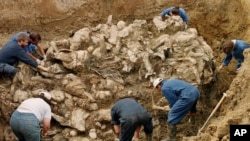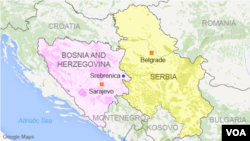Serbian prosecutors said Wednesday that eight men had been arrested in connection with the 1995 Srebrenica massacre, Europe's worst genocide since World War II.
The suspects are accused of killing more than 1,000 Bosnians in a single day at a warehouse near Srebrenica near the end of the 1992-95 war in Bosnia-Herzegovina. In all, an estimated 8,000 Muslim men and boys died in a series of mass killings spread over 11 days in July 1995.
Witnesses on Wednesday said police officers seized the suspects in a series of raids. Prosecutors alleged that the detainees were members of a Bosnian Serb special police unit that included a dozen members already convicted of and imprisoned for the slaughter in and near Srebrenica.
Authorities said the suspects included the unit's commander, Nedeljko Milidragovic, known in wartime as "Nedjo the Butcher." Serbian media said he became a successful postwar Serbian businessman.
The arrests were widely seen as part of an ongoing push by Serbia to come to terms with its wartime past, as the Belgrade government continues pressing for entry into the European Union. The 28-nation bloc has demanded Serbian accountability for the massacre as a prerequisite for membership consideration.
In 2011, Serbia arrested Ratko Mladic, the Bosnian Serb military leader held responsible for the worst atrocities of the war. He is in The Hague on trial in an international criminal court.
Four years earlier, a Serbian war crimes court convicted four former paramilitary security officers of killing six Bosnian men in July 1995 near the village of Trnovo. But the presiding judge said then that there was no evidence linking those killings to the Srebrenica genocide 140 kilometers away.
At the start of the Bosnian war in 1992, Srebrenica was a mainly Muslim town in a Serb-held part of Bosnia, and as such gained protection by the United Nations. In July 1995, Bosnian Serb forces overran the so-called safe haven, separated women and children from men, and then systematically killed the men. Mass graves were later found in the area.
Investigators and historians estimate that 100,000 people, most of them Muslim Bosniaks, died in the war, which followed the collapse of the former Yugoslavia.






